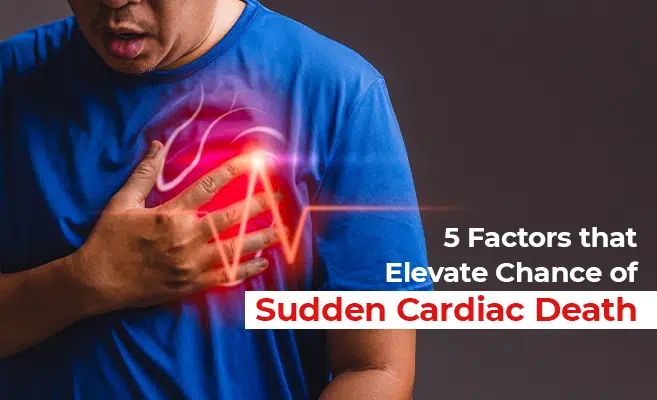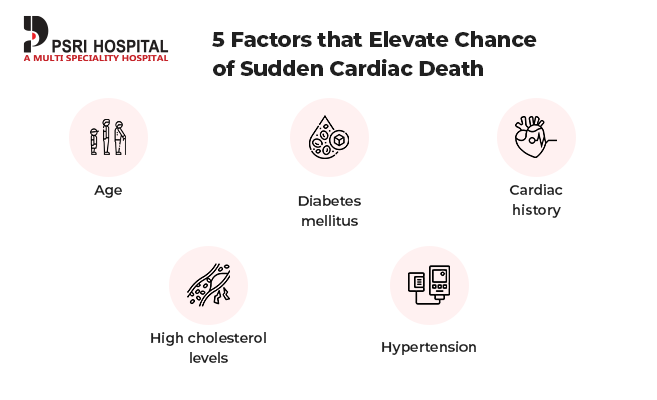5 Factors that Elevate Chance of Sudden Cardiac Death

Heart disease covers problems with the heart or its big blood vessels where the heart doesn’t work right, often beating in odd ways. Many factors, including genetic predispositions and environmental factors such as smoking, diet, and exercise, can cause it. It includes coronary artery disease, congestive heart failure, arrhythmia, and myocardial infarction.
As people get older, the chance of getting heart disease goes up. There are also sudden factors that can cause the heart to stop unexpectedly. Knowing about these risks is crucial so you can avoid them and keep your heart healthy.
So, in this blog, let’s learn more about the risk and protective factors for sudden cardiac death.
Sudden Cardiac Death Factors
In this section, we are discussing some of the common factors increasing the chances of cardiac death:

Age
With the increasing life expectancy, people are living longer. However, this comes with a price – more chances of having cardiac death due to age.
Yes, cardiac death increases significantly with age as people become frailer and less active. Also, the risk of cardiac arrest increases with age, and it is estimated that by the time you reach the age of 80, your risk doubles compared to someone who is 20 years old.
This increase in risk is because there are fewer blood vessels and less elasticity in the arteries, which decreases blood flow and oxygen supply to the heart muscle cells.
Diabetes mellitus
Diabetes mellitus is a metabolic disorder characterized by high blood sugar levels. It is caused by the body not producing enough insulin or not responding to it properly. This leads to high blood sugar levels, which can cause diabetes complications such as kidney disease, heart disease, and stroke. The risk of death from cardiovascular causes increases with diabetes mellitus.
The risk of heart attack increases by 1% for every increase of 100 mg/dL in blood glucose level.
Cardiac history
Cardiac history is a vital factor in increasing the chances of cardiac death. It includes things like heart attack, bypass surgery, and other procedures related to the heart. More and more people are being diagnosed with cardiovascular diseases, so it is important to know how to prevent them.
High cholesterol levels
Cholesterol is a type of lipid present in the blood and other body tissues, which helps in the formation of cell membranes, bile acids, sex hormones, and vitamin D, among others. However, high cholesterol levels are not safe.
High cholesterol levels can lead to serious health conditions, including cardiac death. These are also known as hypercholesterolemia. It is caused by a buildup of cholesterol in the blood vessels and can lead to atherosclerosis, heart attack, or stroke. It is important to have your blood lipid levels checked regularly with a doctor’s supervision, especially if you have high cholesterol levels.
Furthermore, people need to know how to reduce the risk of these conditions. The most common way to lower your cholesterol is by eating a heart-healthy diet and exercising regularly.
Hypertension
Hypertension is a condition in which the blood pressure of the arteries is persistently elevated. It can lead to atherosclerosis, heart failure, cardiac arrest, and stroke. It is a factor in increasing the chances of cardiac death in people older than 65 years. Several other factors, such as obesity, smoking, diabetes, and high cholesterol, increase the risk.
Cardiac death is caused when the heart muscle does not receive enough oxygen and nutrients. The heart muscle can’t contract as well as it should, and thus, it doesn’t pump blood efficiently, which leads to a lack of oxygen in the body.
What Happens Right Before Cardiac Arrest?
Cardiac arrest occurs when the heart suddenly stops beating, cutting off blood flow to the brain and other vital organs. It is often fatal if not treated immediately. In the moments leading up to cardiac arrest, the heart undergoes a steep decline brought on by an electrical or circulatory crisis.
The most common cause is ventricular fibrillation – an erratic twitching of the ventricles rather than coordinated pumping. It starts with an abnormal heart rhythm, like ventricular tachycardia, where electrical signals race out of control. As ventricular fibrillation begins, the heartbeat grows even more chaotic, preventing any blood from leaving the heart. Blood pressure plummets, oxygen cannot reach tissues, and loss of consciousness commences.
Other preceding signs can include extremely low blood pressure, lack of peripheral pulse, confusion, chest pain, and trouble breathing. However, in many cases, a collapse can happen quite abruptly with little warning. Recognizing these danger signs and promptly administering CPR and defibrillation provide the greatest chance of survival in the case of impending sudden cardiac arrest.
Conclusion
People living a sedentary lifestyle are more prone to such conditions. Everyone out there needs to maintain a healthy lifestyle. If people do not focus on the same thing, they cannot deal with the condition and changes in their bodies.
Cardiac diseases are among the serious diseases, and one cannot avoid them. If there is even the slightest symptom, reach out to the cardiologist in Delhi timely to get the diagnosis. Avoiding it can lead to cardiac arrest.
If you are looking for the top heart surgeon in Delhi, visit PSRI Hospital. They have the best team of cardiologists who will help you know about your heart’s condition and suggest treatment. Book an appointment today to know more.
FAQs
What is sudden cardiac death?
Sudden cardiac death is when the heart stops beating unexpectedly, preventing blood flow to the brain and other vital organs. This often leads to death if not treated within minutes.
Who is at risk of sudden cardiac death?
Those at higher risk include people with a history of heart disease, diabetes, high blood pressure, and high cholesterol, as well as the elderly and people who lead inactive lifestyles. Family history can also increase risk.
What causes sudden cardiac death?
The most common cause is a sudden arrhythmia like ventricular fibrillation, where the heart beats chaotically and cannot pump blood effectively. Underlying artery blockages or heart damage often contribute.
What are the symptoms before sudden cardiac death occurs?
Symptoms may include chest pain, trouble breathing, fainting, or collapsing, though sudden cardiac death can also happen abruptly with no warning signs evident.
How can sudden cardiac death be prevented?
Reducing risk includes active lifestyles and maintaining healthy weights, blood pressure, and cholesterol levels. Getting treatment for existing heart conditions can also lower risk, along with avoiding smoking and limiting alcohol intake.

 Book An Appointment
Book An Appointment Virtual Consultation
Virtual Consultation





